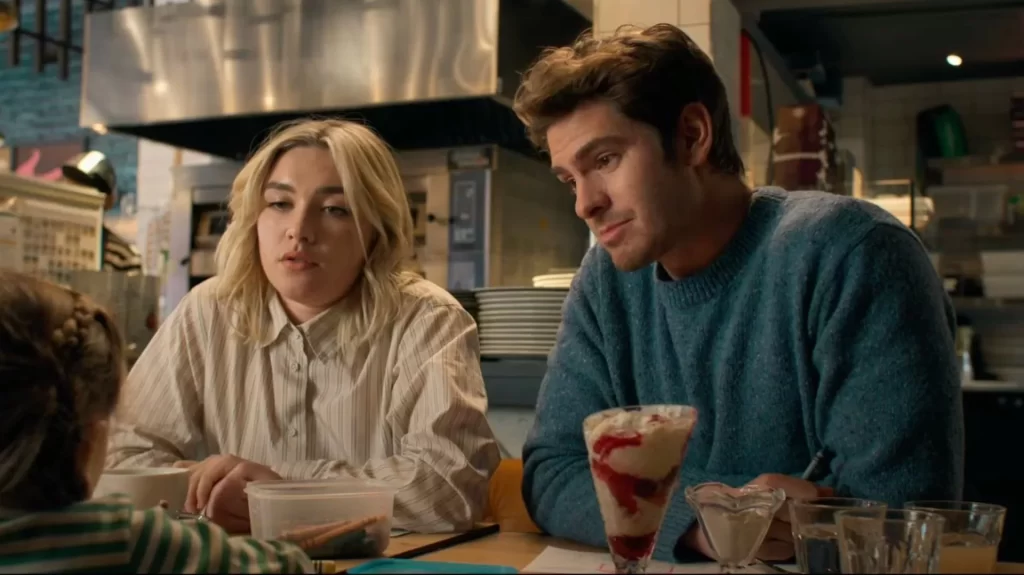A Poignant and Ambitious Exploration of Love and Mortality
“We Live in Time” is a film that has left a lasting impression on viewers and critics alike. Centered around the performances of Florence Pugh and Andrew Garfield, the movie delves into the complexities of love, loss, and the fragility of life itself.
Pugh and Garfield’s chemistry is undeniable, with their characters, Almut and Tobias, sharing a palpable and deeply resonant connection. Pugh’s portrayal is pragmatic yet emotionally nuanced, while Garfield brings a vulnerability and charm that endears him to the audience. Their ability to convey the intricacies of their relationship is a standout aspect of the film.
The non-linear narrative structure, which weaves together various timeframes and memories, has been both praised and criticized. While some viewers find it disorienting, others appreciate the ambitious storytelling and its poignant effect. The chronological jumble is a double-edged sword, appealing to those who enjoy unconventional narratives while potentially alienating those who prefer a more straightforward approach.





“We Live in Time” is a deeply affecting tear-jerker that tackles heavy themes such as cancer diagnoses, birth, romance, and end-of-life decisions. The film’s ability to handle these themes with honesty and without feeling overly manipulative is commendable, though some critics feel that the emotional buttons are pushed too visibly at times. The film’s take on mortality is seen as life-affirming and transcendent by some reviewers, while others view it as a contrived drama.
“Pugh and Garfield’s performances are the beating heart of this film, carrying it through its most disorienting moments.” – The Guardian
“A deeply moving exploration of love and loss that will leave you in a puddle of tears.” – Variety
Director John Crowley’s confidence in the chemistry between Pugh and Garfield is evident, but the film’s reliance on this chemistry to carry the narrative is seen as a potential flaw by some. Nick Payne’s script is ambitious and manages to stay coherent despite its structural uniqueness, but it is also criticized for being shallow and gimmicky without the strong performances of its leads.
“The script is ambitious, but it’s the performances that truly elevate this film.” – IndieWire
“A bold and unconventional love story that will leave you pondering the nature of time and the fleeting beauty of life.” – Rotten Tomatoes
While opinions may vary, “We Live in Time” is a film that has left an indelible mark on audiences, sparking discussions and provoking emotional responses. Whether you embrace its non-linear structure or find it frustrating, the film’s exploration of love and mortality is undeniably poignant and thought-provoking.
“We Live in Time” can be rated as follows:
- Performances: 9/10
- Storytelling and Structure: 7/10
- Emotional Impact: 8/10
- Direction and Script: 7/10
Overall Rating: 7.75/10
“We Live in Time” is a film that thrives on the strength of its lead performances and its emotional depth. While its non-linear narrative may not appeal to everyone, the film’s honest exploration of love and mortality makes it a poignant and memorable experience.
frequently asked questions about the movie “We Live in Time”
What is the premise of “We Live in Time”?
“We Live in Time” is a non-linear romantic drama that follows the lives of Almut (Florence Pugh) and Tobias (Andrew Garfield) as they navigate their relationship across different timelines. The film explores themes of love, loss, and the fragility of life, weaving together various timeframes and memories to tell a poignant story.
What makes the film’s storytelling unique?
The film’s non-linear narrative structure is one of its most distinctive features. Instead of following a straightforward chronological order, the movie jumps back and forth between different moments in Almut and Tobias’ relationship, creating a tapestry of memories and emotions. This unconventional approach has been both praised for its emotional impact and criticized for being disorienting by some viewers.
How have the lead performances been received?
The performances of Florence Pugh and Andrew Garfield have been universally acclaimed as the film’s standout aspect. Critics have praised their palpable chemistry and ability to convey the complexities of their characters’ relationship. Pugh’s pragmatic yet emotionally nuanced portrayal and Garfield’s vulnerable and charming performance have been particularly highlighted.
What themes does the film explore?
“We Live in Time” tackles heavy themes such as cancer diagnoses, birth, romance, and end-of-life decisions. The film’s honest and poignant exploration of mortality and the fleeting nature of life has been praised by many critics, while others have found it overly manipulative at times. The movie’s ability to handle these themes with sensitivity has been a point of discussion.
How has the direction and screenplay been received?
Director John Crowley’s confidence in the chemistry between Pugh and Garfield has been noted, but some critics feel that the film relies too heavily on their performances to carry the narrative. Writer Nick Payne’s ambitious script has been praised for its coherence despite the non-linear structure, but it has also been criticized for being shallow or gimmicky without the strong performances of the leads.
Where can audiences watch “We Live in Time” online?
According to the website Iwatchonline.cc, “We Live in Time” is available to stream online on their platform.



